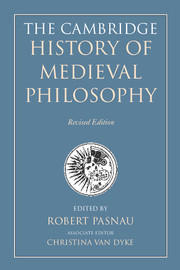Book contents
- Frontmatter
- Contents of Volume 1
- Preface
- List of contributors
- Frontmatter
- Contents of Volume 2
- Introduction
- I Fundamentals
- II Logic and language
- III Natural philosophy
- IV Soul and knowledge
- V Will and desire
- 29 Freedom and determinism
- 30 Intellectualism and voluntarism
- 31 Emotion
- 32 Weakness and grace
- VI Ethics
- VII Political philosophy
- VIII Metaphysics
- IX Theology
- Appendices
- Bibliography of primary sources
- Bibliography of secondary sources
- Index nominum
- Index rerum
- References
29 - Freedom and determinism
from V - Will and desire
Published online by Cambridge University Press: 05 August 2014
- Frontmatter
- Contents of Volume 1
- Preface
- List of contributors
- Frontmatter
- Contents of Volume 2
- Introduction
- I Fundamentals
- II Logic and language
- III Natural philosophy
- IV Soul and knowledge
- V Will and desire
- 29 Freedom and determinism
- 30 Intellectualism and voluntarism
- 31 Emotion
- 32 Weakness and grace
- VI Ethics
- VII Political philosophy
- VIII Metaphysics
- IX Theology
- Appendices
- Bibliography of primary sources
- Bibliography of secondary sources
- Index nominum
- Index rerum
- References
Summary
Nowadays philosophers who worry about determinism are usually worrying about determination by physical causes. A prominent question is thus whether physical causes might necessitate my performing a given action, and yet leave me free to choose with respect to that action. But this is not a central question in medieval discussions of freedom, which tend rather to center on God. There are two features of God’s nature that might seem to imply determinism. First, God is the creator of all things. How, then, does his creative act relate to human acts? If he is the real agent of these acts, it would seem that it is God, and not us, who is morally responsible for them. Second, God is omniscient, which seems to mean that God knows in advance what I will do. How, then, can I be free with respect to what I do?
Why were the medievals not particularly worried about physical determinism? In part the explanation, as is so often the case, goes back to Aristotle. Aristotle and philosophers in the Aristotelian tradition make a fundamental distinction between what is necessary, essential, and always the case, and what is possible, accidental, and only sometimes the case. For example, human beings are necessarily, essentially, and always rational, whereas human beings are merely possibly, accidentally, and sometimes bald. Already in the late ancient tradition, most particular events and properties in the physical world were normally consigned to the realm of chance and the accidental. By the medieval period, Aristotelianism so dominates natural philosophy that philosophers rarely take seriously the idea that physical causes could necessitate everything, including human actions.
- Type
- Chapter
- Information
- The Cambridge History of Medieval Philosophy , pp. 399 - 413Publisher: Cambridge University PressPrint publication year: 2014
References
- 1
- Cited by



